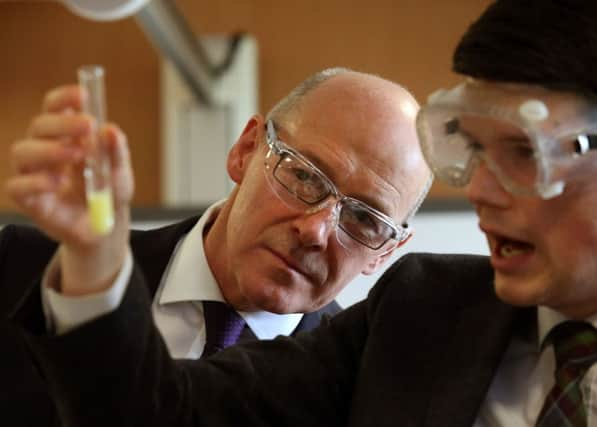John Swinney wants schools grading system scrapped to stem ‘culture of fear’ among Scots teachers


John Swinney said there was “merit” in the idea of removing the six grades from school reports and urged chief inspector Gayle Gorman to consider the idea.
Under the existing system, a school’s performance in various areas is rated as either unsatisfactory, weak, satisfactory, good, very good or excellent.
Advertisement
Hide AdAdvertisement
Hide AdSpeaking at a conference in Edinburgh yesterday organised by Scotland’s largest teaching union, the EIS, Mr Swinney stressed that any decision to scrap school grades ultimately rested with Education Scotland.
Ms Gorman confirmed the idea was being explored by Education Scotland, but was at an early stage and that no formal consultation had yet been conducted.
The confirmation came as the EIS warned the Scottish Government that it had just one week to improve its pay offer to teachers or union members would vote on strike action. Mr Swinney said negotiations were ongoing, but that “a huge amount of public money” had been offered to teachers for a pay deal.
EIS general secretary Larry Flanagan said teachers felt undervalued and insisted the government must improve its pay offer or risk strikes.
A ballot on whether teachers should strike is due to take place next Monday.
Members of the EIS rejected a pay offer from councils and the government earlier this month for a series of rises worth 9 per cent by April, plus a 3 per cent rise next year.
The union wanted teachers to get a 10 per cent rise from April last year.
Mr Flanagan said: “The only thing that will stop the ballot will be an improved offer. To date that hasn’t been forthcoming, but we continue to be in dialogue seeking a negotiated settlement rather than continue to the strike action.”
Advertisement
Hide AdAdvertisement
Hide AdIn response to a question from a headteacher from Glasgow, Mr Swinney said the grade inspectors gave a school was given too much attention and that narrative conclusions might be better.
Jean Miller, headteacher at Smithycroft Secondary School in Riddrie, said Wales was considering removing grades from its reports and asked if this could happen in Scotland.
Mr Swinney replied: “I think you’ve got a point. Inspection is carried out independent of me, but obviously I set out to the chief inspector what my aspirations are about inspection.
“I want inspection to be about improvement, I don’t want inspection to be for any other purpose. I quite understand the temptation … just to gravitate towards, ‘What did you get?’
“I think there’s merit in that argument [of removing grades]. The chief inspector is here and she’s hearing every word I’m saying, so she can reflect on it.”
He later added: “Inspection reports are comprehensive, thorough, detailed documents. They are in my view a good read because they tell you what’s going on within a school and what the challenges and what the strengths are.
“But I would accept that sometimes that gets simply focused on the individual grades that emerge from that report. I think there’s a fair issue to explore.”
Mr Swinney said he was not allowed to be involved in the decision, but added: “The chief inspector can consider if there is a case for not having grades, but simply having a commentary which gives very clear indications of what steps are required to improve the performance of that school.”
Advertisement
Hide AdAdvertisement
Hide AdDuring his speech to teachers, Mr Swinney said there was still a “culture of fear” in schools about when inspectors might arrive, which he wanted to challenge.
However, Scottish Conservative education spokeswoman Liz Smith said any such change could make school reports seem “subjective” and would worry parents.
She said: “School inspections are a vital part of the education system in terms of maintaining and enhancing school standards. One of the most important reasons for school inspections is that they show the year-on-year performance of pupils. Graded criteria can be very helpful in that respect.
“Many parents find the school inspection reports difficult to read and therefore this change will only compound the problem.”
